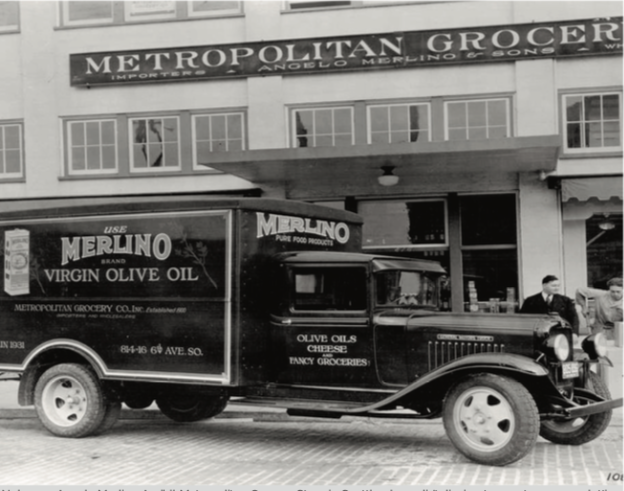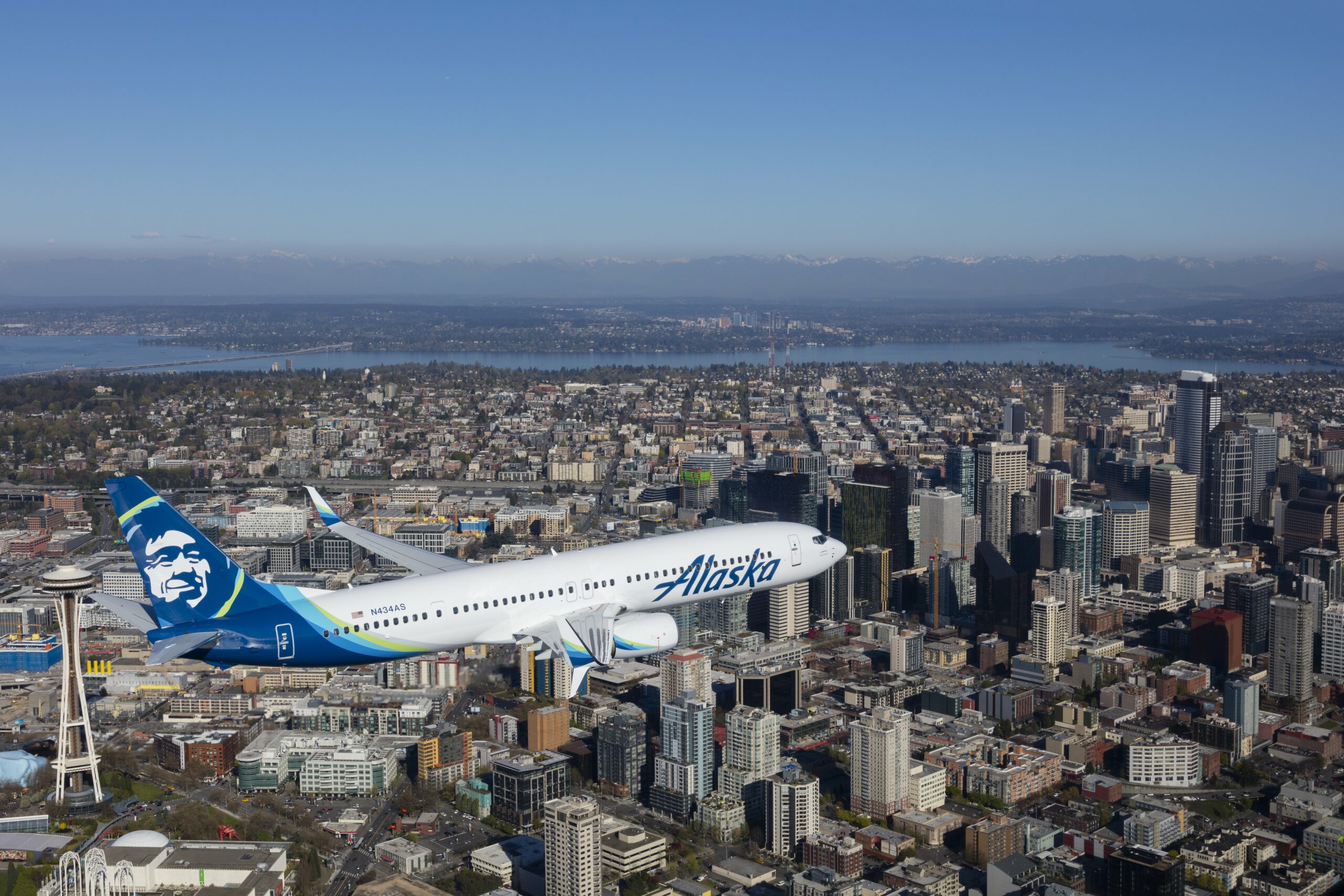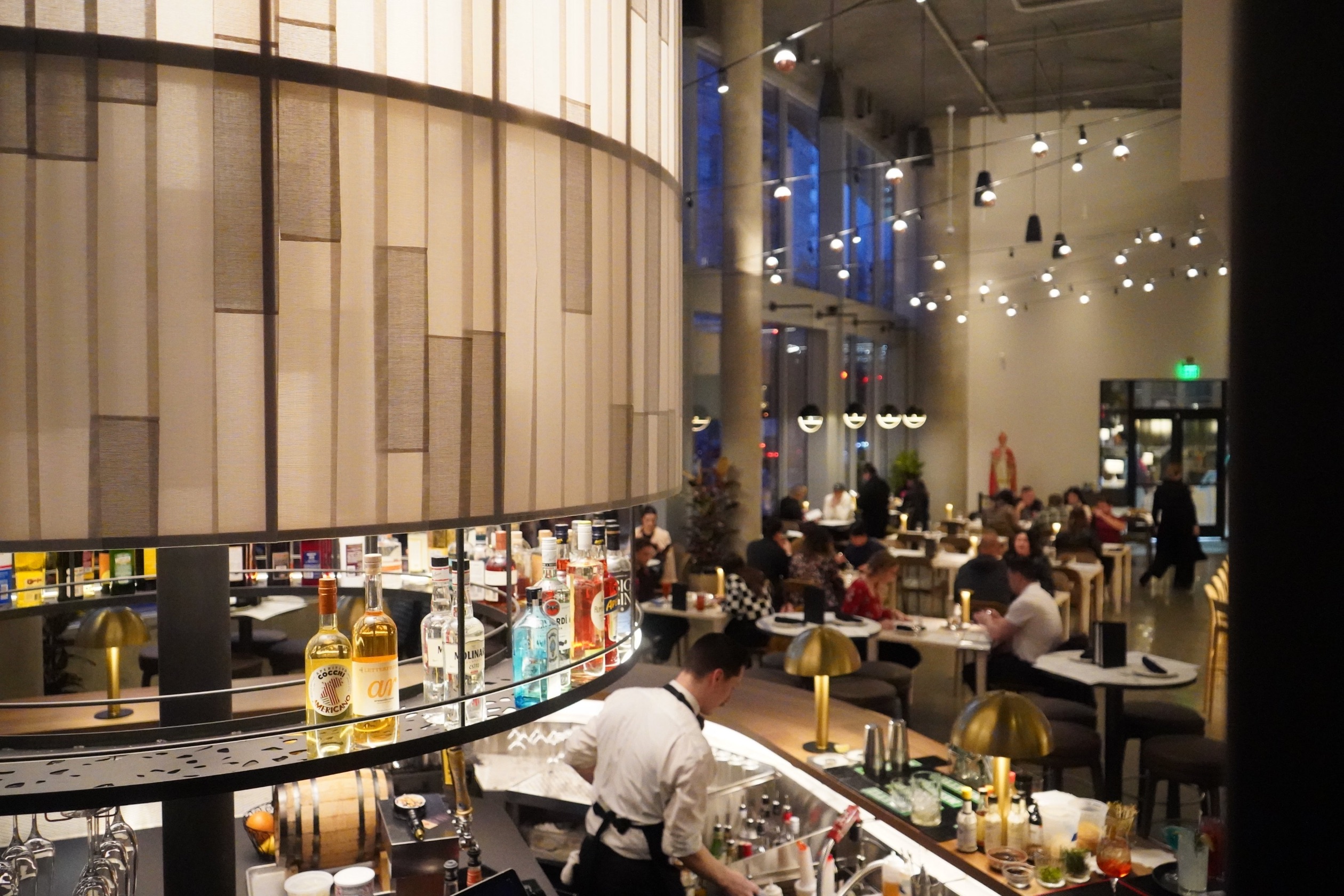Many Italian immigrants who arrived in the Northwest in the late 1890s found themselves toiling for low pay in dangerous and physically demanding jobs, such as logging or mining. Those who could find another way to make a living did so.
One of these newcomers was Angelo Merlino, born in 1867 in Taranta Peligna in the Abruzzo region of Italy. Merlino came to the United States as a young man and worked his way across the country, arriving in the Pacific Northwest in 1896.
He found work in the coal mines of Black Diamond, Wash., about 35 miles southeast of Seattle, and traveled often into the city for food and wine. Soon, he started importing cheese, pasta and olive oil in bulk, selling items to his fellow miners. He became so successful that he decided to quit mining and open an Italian grocery store.
A friend from the Piedmont region offered Angelo a loan and with the money, he opened Metropolitan Grocery Store in 1900. Not only did he supply the Italian community in Seattle with the food and wines they missed from the old country, but he also ran an informal bank. “The Abruzzesi – the people from the Abruzzo area of Italy – were very close, and they didn’t trust the banks. So they’d leave their money with old man Merlino, and he would put it in his safe,” Bruce Biesold, president of Merlino Foods, told the Seattle Times in 2015.
Metropolitan Grocery also served as a social hub and gathering place. Angelo knew what it was like to arrive in a new town, surrounded by strangers speaking a strange language. At his grocery store, newcomers could stop in to get recommendations about housing, ask about jobs or experience a touch of home.
In 1915, Merlino purchased a tract of land south of downtown Seattle where he built a two-story factory to make pasta. He told the local paper that he chose to build the Seattle Macaroni Factory in that particular location for its “paved streets, easy grades, accessibility to the depots, and low price of land….It is less than one mile from the heart of the city.”
As his business grew, Merlino had his share of ups and downs. In 1923, he faced a lawsuit brought by another olive oil importer who asked that Merlino be kept from using the map of the Kingdom of Italy on his olive oil label. The other importer was seeking $35,000 in damages, but a King County judge found in Merlino’s favor and denied the request.
As with many Italian families, Merlino’s sons Ubaldo and Attilio grew up in the business. Attilio told stories of working in the warehouse as a boy, filling up the olive oil bottles. By 1920, both sons were working for their father full-time, and the pair took over when Angelo retired in 1946. (Angelo Merlino died in 1957 at the age of 89).
Although Angelo Merlino & Sons was created to supply the Italian community with products not available or hard to find in the Northwest, the family soon embraced the culinary needs of other nationalities as well. The Greeks went to Merlino’s for goat cheese, the Spanish bought their olives there, and the Norwegians counted on them for lutefisk.
Ubaldo died in 1968. By 1976, as Attilio’s health was waning, Bruce and Phyllis Biesold stepped in to purchase Merlino’s. Both were well-acquainted with the food industry. For years, Bruce had managed distribution and operations for more than 30 local Kentucky Fried Chicken establishments.
Phyllis Biesold had grown up in the Italian neighborhood; her father Gill Centioli was Attilio’s godson. Centioli ran a restaurant in downtown Seattle called Gill’s Beachhead and Wheel Room, and was a local fast-food pioneer in the early 1950s.
The Biesold family began operating in a rented facility in Seattle’s Rainier Valley; Bruce was the only full-time employee. His wife Phyllis, along with sons Jeff and Todd and daughter Ronna, helped out in the evenings and on weekends. Later, Jeff and Todd started driving the delivery routes.
Today, Jeff Biesold handles sales, purchasing and customer service while Todd deals with finances and legal issues and Ronna works in the office. Both Bruce and Phyllis, now in their late 70s, still come to work two days a week.
“The business has come a long way from Angelo’s day,” said Jeff Biesold. “Although our heritage is firmly rooted in the Italian community, today we serve all aspects of the restaurant business. Our customer base includes most of the high-quality restaurants in town – the ones with the white tablecloths. We supply high-end bakeries and hotels, as well.”
The company hired its first non-family employee in 1978; today, it employs about 100 people. As in the early days when Angelo Merlino began the business, the customer remains king. “Service is everything in this business,” said Biesold. “We’re only minutes from downtown, so if a chef runs out of prosciutto during the lunch hour, I can dispatch someone with his order and get it to him in just minutes, even if it’s not his regular delivery day.”
Since 2007, Merlino Foods has occupied a 98,000-square-foot warehouse in south Seattle. Its seasonal product catalog runs more than 100 pages; the cheese offerings alone occupy a dozen pages. A variety of products are sold under the Merlino private label, including canned tomatoes and, of course, its signature product – Merlino’s extra virgin Italian olive oil – still one of the company’s best sellers today.
Molti immigrati italiani che arrivarono nel Nord-Ovest alla fine degli anni ’90 dell’Ottocento si trovarono impiegati in lavori pericolosi e fisicamente impegnativi, come il taglio e il trasporto di legname o l’estrazione mineraria. Quanti potevano trovare un altro modo di guadagnarsi da vivere, lo trovarono.
Uno di questi nuovi arrivati fu Angelo Merlino, nato nel 1867 a Taranta Peligna, in Abruzzo. Merlino giunse negli Stati Uniti da giovane e si fece strada attraverso il paese, arrivando nel Nord-Ovest del Pacifico nel 1896.
Trovò lavoro nelle miniere di carbone di Black Diamond, Wash., a circa 35 miglia a sud-est di Seattle, ma si recava spesso in città per cibo e vino. Ben presto, iniziò a importare formaggio, pasta e olio d’oliva sfusi, vendendo gli articoli ai suoi colleghi minatori. Il successo fu tale che decise di abbandonare l’attività mineraria e di aprire un negozio di alimentari italiano.
Un amico piemontese offrì ad Angelo un prestito e con il denaro aprì il Metropolitan Grocery Store nel 1900. Non solo forniva alla comunità italiana di Seattle il cibo e i vini che mancavano dal vecchio paese, ma gestiva anche una banca informale. “Gli abruzzesi erano molto chiusi, e non si fidavano delle banche. Così lasciavano i loro soldi al vecchio Merlino, e lui li metteva nella sua cassaforte”, ha detto Bruce Biesold, presidente di Merlino Foods, al Seattle Times nel 2015.
Il Metropolitan Grocery funzionava anche da centro sociale e luogo di ritrovo. Angelo sapeva come ci si sente ad arrivare in una città nuova, circondato da sconosciuti che parlano una lingua straniera. Nel suo negozio di alimentari, i nuovi arrivati potevano fermarsi per ottenere consigli sugli alloggi, chiedere informazioni sul lavoro o sperimentare un tocco di casa.
Nel 1915, Merlino acquistò un pezzo di terreno a sud del centro di Seattle, dove costruì una fabbrica a due piani per fare la pasta. Disse al giornale locale che aveva scelto di costruire la fabbrica di Maccheroni di Seattle in quella particolare posizione per le sue “strade lastricate, le pendenze facili, l’accessibilità ai depositi, e il basso prezzo del terreno….. a meno di un miglio dal cuore della città”.
Con la crescita dell’attività, Merlino ha avuto la sua parte di alti e bassi. Nel 1923, si trovò di fronte ad una causa intentata da un altro importatore di olio d’oliva che chiedeva che Merlino non usasse la mappa del Regno d’Italia sull’etichetta dell’olio d’oliva. L’altro importatore chiedeva 35.000 dollari di risarcimento danni, ma un giudice della King County decise in favore di Merlino e respinse la richiesta.
Come per molte famiglie italiane, i figli di Merlino, Ubaldo e Attilio, sono cresciuti nell’azienda. Attilio ha raccontato di aver lavorato nel magazzino da ragazzo, riempiendo le bottiglie di olio d’oliva. Nel 1920, entrambi i figli lavoravano per il padre a tempo pieno, e la coppia prese il sopravvento quando Angelo si ritirò nel 1946. (Angelo Merlino morì nel 1957 all’età di 89 anni).
Anche se Angelo Merlino & Sons era stato creato per fornire alla comunità italiana prodotti non disponibili o difficili da trovare nel Nord-Ovest, la famiglia ha presto abbracciato le esigenze culinarie di altre nazionalità. I greci andavano da Merlino per il formaggio di capra, gli spagnoli vi compravano le loro olive e i norvegesi contavano su di loro per il lutefisk.
Ubaldo morì nel 1968. Nel 1976, mentre la salute di Attilio diminuiva, Bruce e Phyllis Biesold intervennero per acquistare il Merlino’s. Entrambi conoscevano bene l’industria alimentare. Per anni, Bruce aveva gestito la distribuzione e le operazioni per più di 30 stabilimenti locali del Kentucky Fried Chicken.
Phyllis Biesold era cresciuta nel quartiere italiano; suo padre Gill Centioli era il figlioccio di Attilio. Centioli gestiva un ristorante nel centro di Seattle chiamato Gill’s Beachhead and Wheel Room, ed era un pioniere del fast-food locale all’inizio degli anni ’50.
La famiglia Biesold iniziò ad operare in una struttura in affitto nella Rainier Valley di Seattle; Bruce era l’unico dipendente a tempo pieno. Sua moglie Phyllis, insieme ai figli Jeff e Todd e alla figlia Ronna, aiutavano la sera e nei fine settimana. Più tardi, Jeff e Todd iniziarono a gestire le consegne.
Oggi, Jeff Biesold si occupa delle vendite, degli acquisti e del servizio clienti, mentre Todd si occupa di questioni finanziarie e legali e Ronna lavora in ufficio. Sia Bruce che Phyllis, ora ultrasettantenni, vengono ancora al lavoro due giorni alla settimana.
“L’azienda ha fatto molta strada dai tempi di Angelo”, ha detto Jeff Biesold. “Anche se il nostro patrimonio è saldamente radicato nella comunità italiana, oggi ci occupiamo di tutti gli aspetti della ristorazione. La nostra clientela comprende la maggior parte dei ristoranti di alta qualità in città: quelli con le tovaglie bianche. Forniamo anche panetterie e alberghi di alta gamma”.
L’azienda ha assunto il suo primo dipendente non familiare nel 1978; oggi dà lavoro a circa 100 persone. Come nei primi tempi, quando Angelo Merlino iniziò l’attività, il cliente rimane il re. “Il servizio è tutto in questo business”, ha detto Biesold. “Siamo a pochi minuti dal centro della città, quindi se uno chef finisce il prosciutto durante l’ora di pranzo, posso spedire qualcuno con il suo ordine e consegnarglielo in pochi minuti, anche se non è il suo giorno di consegna regolare”.
Dal 2007, Merlino Foods occupa un magazzino di 98.000 metri quadrati a sud di Seattle. Il suo catalogo dei prodotti stagionali conta più di 100 pagine; le sole offerte di formaggio occupano una dozzina di pagine. Diversi prodotti sono venduti con il marchio privato Merlino, tra cui il pomodoro in scatola e, naturalmente, il suo prodotto di punta, l’olio extravergine di oliva italiano Merlino, che è ancora oggi uno dei prodotti più venduti dall’azienda.






























